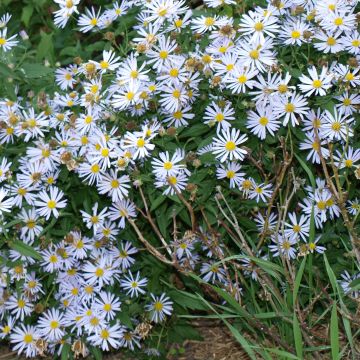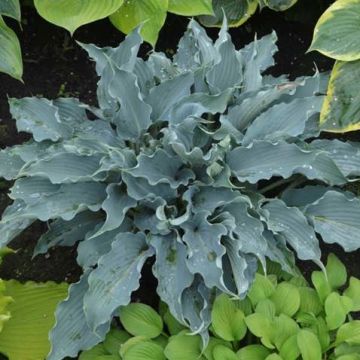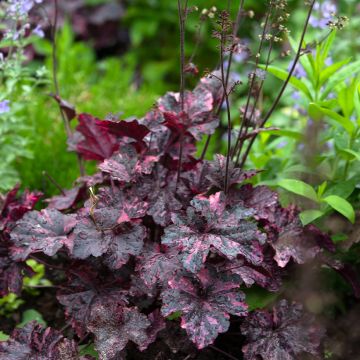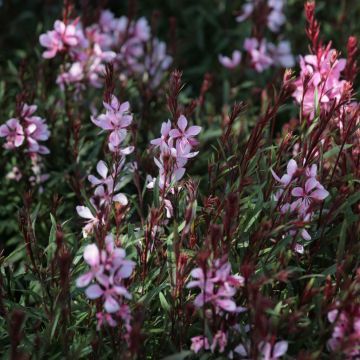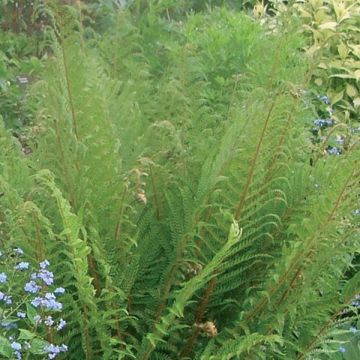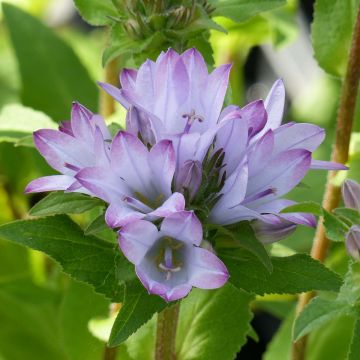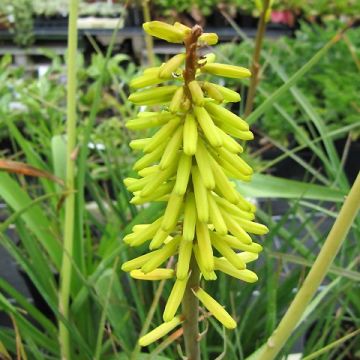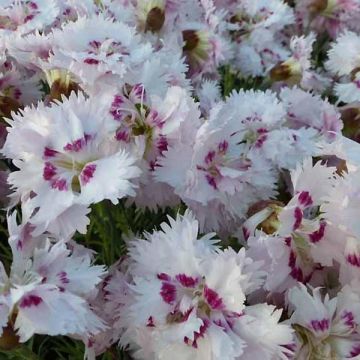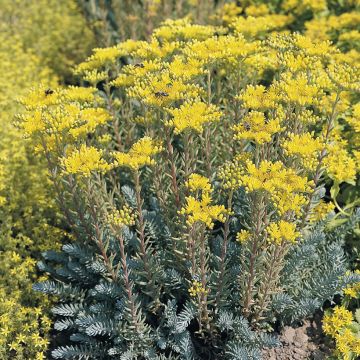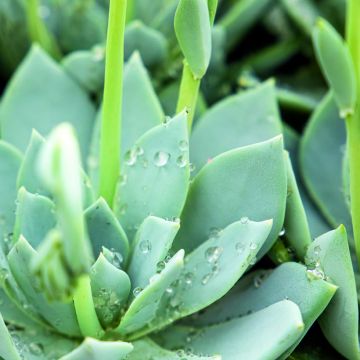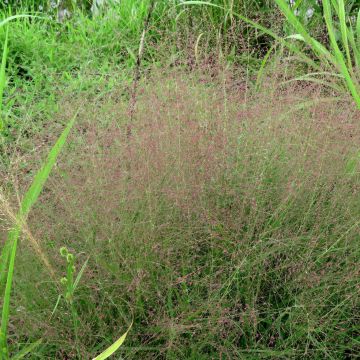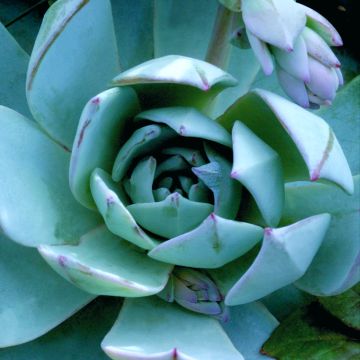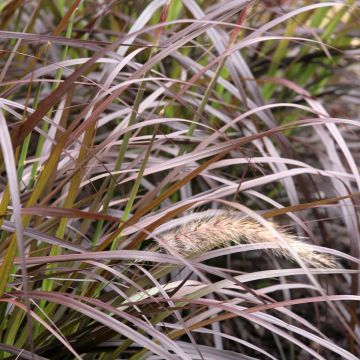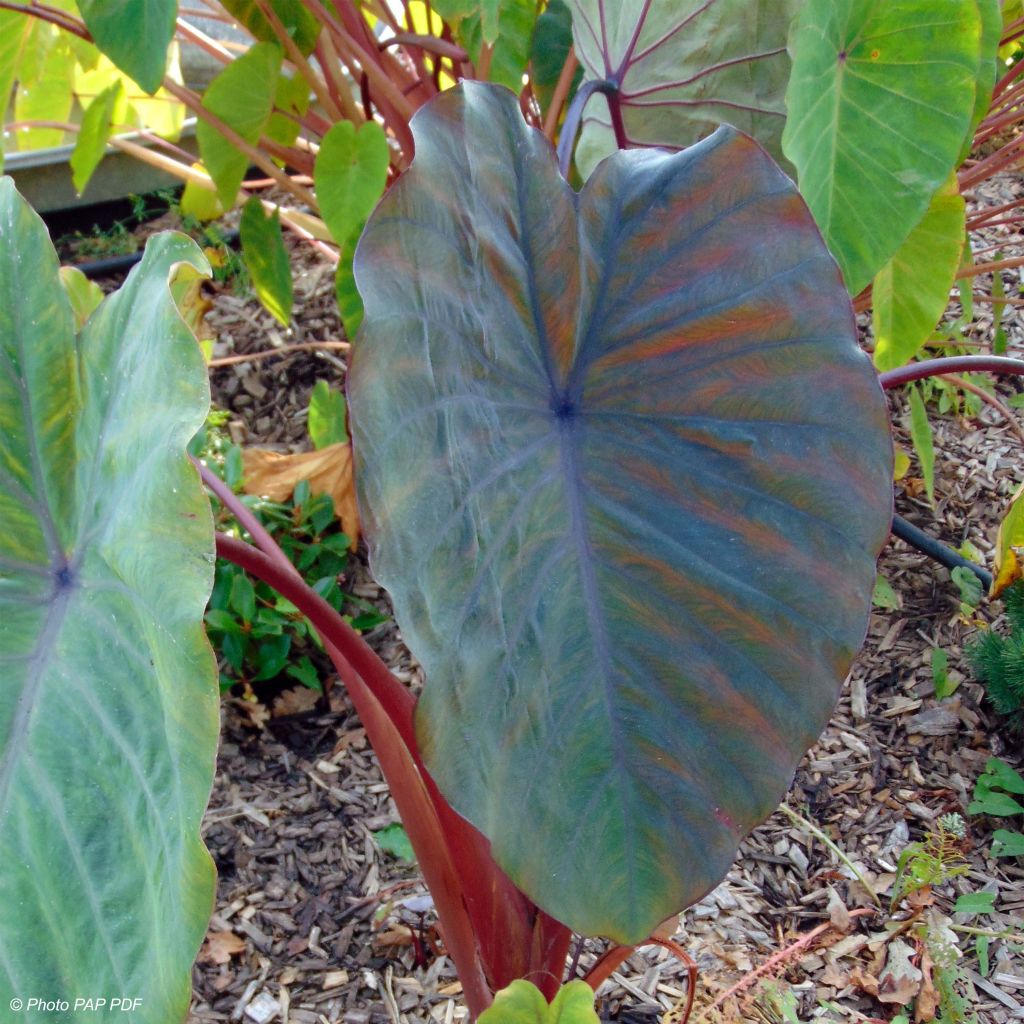

Colocasia esculenta Sangria
Colocasia esculenta Sangria
Colocasia x esculenta Sangria
Taro, Elephant Ear, Cocoyam, Eddo, Dasheen
Delighted, excellent product that grows very quickly, beautiful leaves and stem in deep purple, highly recommend.
Marie, 14/12/2024
This item cannot be shipped to the selected country
Delivery charge from €5.90
More information
Schedule delivery date,
and select date in basket
This plant carries a 12 months recovery warranty
More information
We guarantee the quality of our plants for a full growing cycle, and will replace at our expense any plant that fails to recover under normal climatic and planting conditions.
From €5.90 for pickup delivery and €6.90 for home delivery
Express home delivery from €8.90.
Does this plant fit my garden?
Set up your Plantfit profile →
Description
Colocasia esculenta 'Sangria' is a variety of Elephant's Ear from the same strain as the 'Pink China' cultivar. Equally cold-resistant and bushy, it offers even more colourful foliage. Its large emerald green leaves are adorned with bluish veins, sometimes tinged with purple, and carried on magnificent bright red petioles, reminiscent of rhubarb stems. This exotic perennial can be grown in the ground in most regions. It thrives in full sun or partial shade, in moist to wet, fertile soil that is low in limestone.
Originally from India, Colocasia esculenta, also known as 'true taro' or edible taro, spread long ago to tropical regions of South America and Oceania, and later to tropical Africa. This rhizomatous perennial plant is related to Arums and Ipomoeas, and belongs to the Araceae family. The 'Sangria' cultivar has exceptional resistance to cold and wet conditions, and a strong tendency to sucker. It is a herbaceous perennial that grows from a tuberous rhizome, forming a scaly corm covered with thick skin. The mature plant can reach a height of 1.25m (4ft) and a diameter of 90cm (35in). It has beautiful, slightly elongated heart-shaped leaves, bluish green, veined in blue-grey and tinged with pink. The leaf blade can reach 60cm (24in) long and 40cm (16in) wide, carried by a long red petiole that is sheathing at the base. The leaf surface is water-repellent. As it grows, the plant branches out from the base and produces numerous thread-like tubers that give rise to vigorous young plants. When an old leaf is removed, two new ones take its place.
Colocasia 'Sangria' is a tropical plant that is very easy to grow in the garden or indoors, even in wet and cool climates. It prefers a sunny or partially shaded location and is particularly resistant to frost when protected by a thick mulch. The plant can withstand temperatures down to -15°C (5°F) and regrow in spring. It makes a focal point in any setting, garden, house, or conservatory. It is marvellous placed in a large pot on a terrace, balcony, patio, or the edge of a pond. This voracious plant pairs well with cannas, arums (Zantedeschia aethiopica), banana plants, Gunnera, or tree ferns, whose magnificence recalls ancient forests. This plant brings the lushness of its native lands to our gardens and urban balconies. It is also a beautiful indoor plant that, like Monstera deliciosa, becomes a centrepiece in colonial-exotic, vintage, contemporary, English, or traditional decor over time.
True taro is consumed in Africa, China, Polynesia, and several other parts of the world. Its tubers are rich in starch, and its young leaves are eaten like spinach.
Report an error about the product description
Colocasia esculenta Sangria in pictures
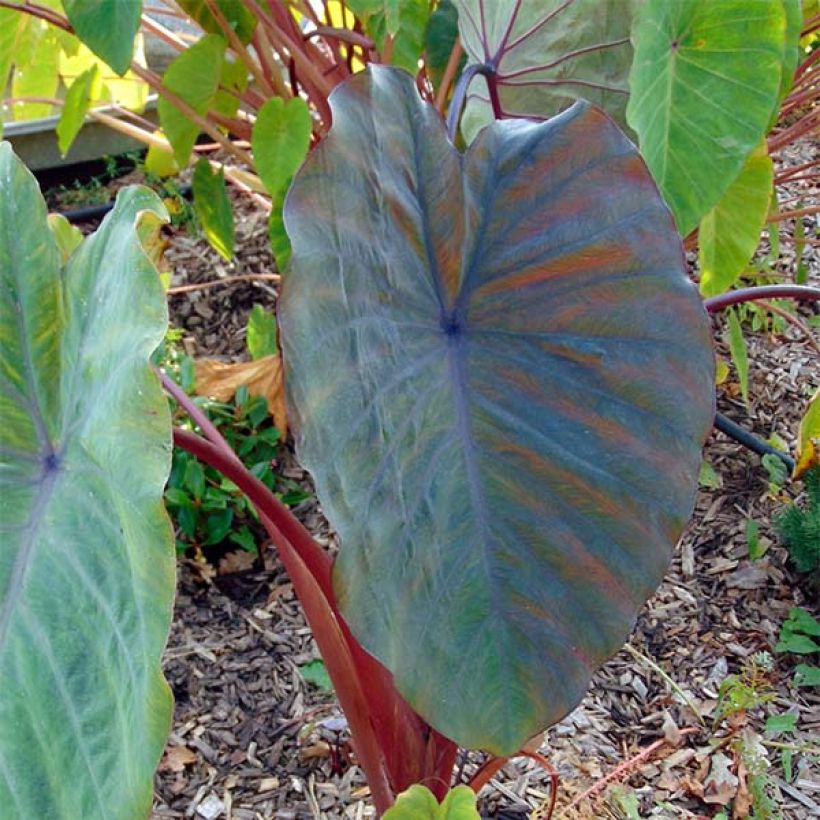

Flowering
Foliage
Plant habit
Safety measures
Botanical data
Colocasia
x esculenta
Sangria
Araceae
Taro, Elephant Ear, Cocoyam, Eddo, Dasheen
Cultivar or hybrid
atteintescutaneomuqueuses
Cette plante peut provoquer l'apparition de réactions cutanées indésirables, une atteinte des yeux, ou des difficultés respiratoires si elle est ingérée.
Ne la plantez pas là où de jeunes enfants peuvent évoluer. Evitez tout contact avec la peau: privilégiez l'emploi de gants pour la manipuler. En cas de contact, lavez-vous soigneusement les mains et rincez abondamment à l'eau la zone concernée. Lavez les vêtements entrés en contact. En cas de réaction cutanée, contactez votre médecin ou le centre antipoison le plus proche de chez vous. En cas d'atteinte étendue ou de difficultés respiratoires, appelez immédiatement le 15 ou le 112.Pensez à conserver l'étiquette de la plante, à la photographier ou à noter son nom, afin de faciliter le travail des professionnels de santé.
Davantage d'informations sur https://plantes-risque.info
Other Perennials A to Z
Planting and care
Plant in a sunny position or partial shade. They need moist to wet, fertile and humus-rich, non-chalky soil (PH between 5.5 and 7) and appreciate a nitrogen fertilizer. You can plant your Colocasia in large containers, with regular and abundant watering during the growing season, reduced in winter. If the atmosphere is too dry in winter, the plants can be attacked by red spider mites. Usually grown as greenhouse or conservatory plants, they are actually quite hardy perennials. You can grow them in the garden, mulching the crown well in winter. If the soil is waterlogged in winter, the rootstock can rot, so the soil will need to be well-drained. Beware of attacks by slugs and snails that enjoy the young leaves.
One of the reasons for failures in the cultivation of colocasia lies in their mode of propagation: the parent rootstock if buried at planting and well protected from the cold, has a lifespan of 2 years. It gives birth to rootstocks that form on the surface of the soil, thus being more exposed to frost. Shoots from varieties that are more sensitive to cold should therefore be systematically replanted deeper or covered with a thick layer of compost and abundantly mulched to escape the rigors of winter.
Planting period
Intended location
Care
-
, onOrder confirmed
Reply from on Promesse de fleurs
Coloured foliage perennials
Haven't found what you were looking for?
Hardiness is the lowest winter temperature a plant can endure without suffering serious damage or even dying. However, hardiness is affected by location (a sheltered area, such as a patio), protection (winter cover) and soil type (hardiness is improved by well-drained soil).

Photo Sharing Terms & Conditions
In order to encourage gardeners to interact and share their experiences, Promesse de fleurs offers various media enabling content to be uploaded onto its Site - in particular via the ‘Photo sharing’ module.
The User agrees to refrain from:
- Posting any content that is illegal, prejudicial, insulting, racist, inciteful to hatred, revisionist, contrary to public decency, that infringes on privacy or on the privacy rights of third parties, in particular the publicity rights of persons and goods, intellectual property rights, or the right to privacy.
- Submitting content on behalf of a third party;
- Impersonate the identity of a third party and/or publish any personal information about a third party;
In general, the User undertakes to refrain from any unethical behaviour.
All Content (in particular text, comments, files, images, photos, videos, creative works, etc.), which may be subject to property or intellectual property rights, image or other private rights, shall remain the property of the User, subject to the limited rights granted by the terms of the licence granted by Promesse de fleurs as stated below. Users are at liberty to publish or not to publish such Content on the Site, notably via the ‘Photo Sharing’ facility, and accept that this Content shall be made public and freely accessible, notably on the Internet.
Users further acknowledge, undertake to have ,and guarantee that they hold all necessary rights and permissions to publish such material on the Site, in particular with regard to the legislation in force pertaining to any privacy, property, intellectual property, image, or contractual rights, or rights of any other nature. By publishing such Content on the Site, Users acknowledge accepting full liability as publishers of the Content within the meaning of the law, and grant Promesse de fleurs, free of charge, an inclusive, worldwide licence for the said Content for the entire duration of its publication, including all reproduction, representation, up/downloading, displaying, performing, transmission, and storage rights.
Users also grant permission for their name to be linked to the Content and accept that this link may not always be made available.
By engaging in posting material, Users consent to their Content becoming automatically accessible on the Internet, in particular on other sites and/or blogs and/or web pages of the Promesse de fleurs site, including in particular social pages and the Promesse de fleurs catalogue.
Users may secure the removal of entrusted content free of charge by issuing a simple request via our contact form.
The flowering period indicated on our website applies to countries and regions located in USDA zone 8 (France, the United Kingdom, Ireland, the Netherlands, etc.)
It will vary according to where you live:
- In zones 9 to 10 (Italy, Spain, Greece, etc.), flowering will occur about 2 to 4 weeks earlier.
- In zones 6 to 7 (Germany, Poland, Slovenia, and lower mountainous regions), flowering will be delayed by 2 to 3 weeks.
- In zone 5 (Central Europe, Scandinavia), blooming will be delayed by 3 to 5 weeks.
In temperate climates, pruning of spring-flowering shrubs (forsythia, spireas, etc.) should be done just after flowering.
Pruning of summer-flowering shrubs (Indian Lilac, Perovskia, etc.) can be done in winter or spring.
In cold regions as well as with frost-sensitive plants, avoid pruning too early when severe frosts may still occur.
The planting period indicated on our website applies to countries and regions located in USDA zone 8 (France, United Kingdom, Ireland, Netherlands).
It will vary according to where you live:
- In Mediterranean zones (Marseille, Madrid, Milan, etc.), autumn and winter are the best planting periods.
- In continental zones (Strasbourg, Munich, Vienna, etc.), delay planting by 2 to 3 weeks in spring and bring it forward by 2 to 4 weeks in autumn.
- In mountainous regions (the Alps, Pyrenees, Carpathians, etc.), it is best to plant in late spring (May-June) or late summer (August-September).
The harvesting period indicated on our website applies to countries and regions in USDA zone 8 (France, England, Ireland, the Netherlands).
In colder areas (Scandinavia, Poland, Austria...) fruit and vegetable harvests are likely to be delayed by 3-4 weeks.
In warmer areas (Italy, Spain, Greece, etc.), harvesting will probably take place earlier, depending on weather conditions.
The sowing periods indicated on our website apply to countries and regions within USDA Zone 8 (France, UK, Ireland, Netherlands).
In colder areas (Scandinavia, Poland, Austria...), delay any outdoor sowing by 3-4 weeks, or sow under glass.
In warmer climes (Italy, Spain, Greece, etc.), bring outdoor sowing forward by a few weeks.



































